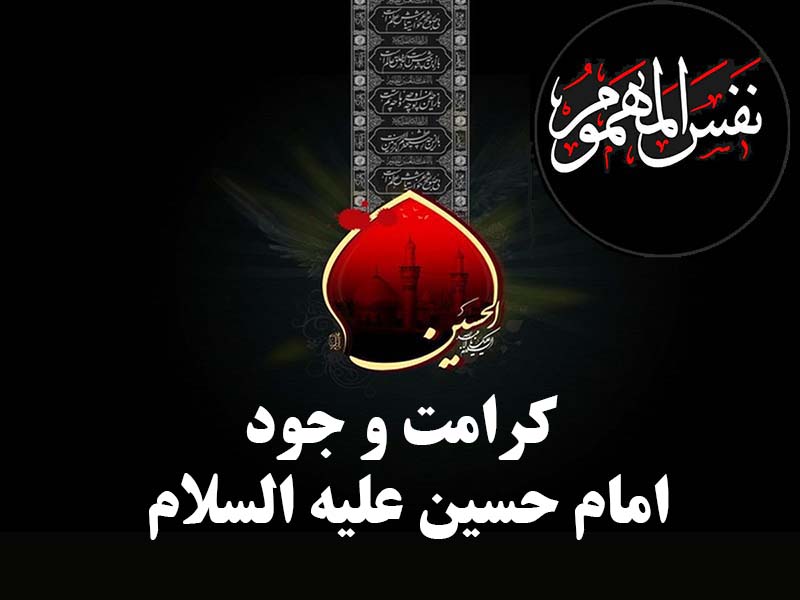در روایت است که فاطمه علیهاالسلام دو فرزندش حسن و حسین علیهماالسلام را نزد رسول خدا صلی الله علیه و آله و سلم آورد در هنگام مرض موت آن حضرت و عرض کرد: یا رسول الله ! اینان پسران تواند، چیزی بدانها ارث بده؛ فرمود: هیبت و سیادتم از آن حسن علیه السلام جود و شجاعتم از آن حسین علیه السلام باشد.
مشهور است که آن حضرت مهمان نواز ، حاجت برآور، خویش دوست بود، به فقیران
بخشش میکرد، خواهش مسائل را اجابت می نمود و برهنه را می پوشانید و گرسنه را سیر میکرد و قرض دار را عطا میداد و يتیم را نوازش میکرد و حاجتمند را کمک می داد وكم می شد که مالی به او برسد و آن را تقسیم نکند.
روایت شده است که چون معاویه به مکه رفت، مال بسیار و جامه های بی شمار به وی تقدیم داشت و نپذیرفت و این خود شيوة جواد و دأب راد و نمایش صاحب سخاوت و ستایش دارای مکارم اخلاق است، کردارش گواہ کرم است و ناطق به اخلاق ستوده ، و باید دانست کرامتی که جود و بخشش یک رشته آن است در خاندان پیغمبر منحصر است و دیگران را جز به طور مجاز از آن بهره ای نیست، از این راه به هیچکدام از بنی هاشم بخل ورزی منسوب نیست زیرا همه آنان در افاضه چون بارانند و در شهامت چون شیران .
على بن الحسین علیهماالسلام در خطبه شام خود گوید : « به ما است که علم و حلم، سماحت و فصاحت و شجاعت و محبت در دل مؤمنان عطا شده است».
آنها دریای جوشان و ابر پربارانند، هر آنچه از کار خیر و نیک کردند پدرها از پدرها ارث بردند، خوش اخلاقی را شریعت خود ساخته و وسیله درک نهایت شرف شناخته زیرا فرزندانی شریف از پدرهایی کریمند، آنان پیشوایان امت و سران ملت و برگزیدگان مردم و سادات عربند و خلاصه بنی آدم و ملوک دنیا و رهبران آخرت و حجج خدا در میان بندگان و امینان وی در هر شهرستان و باید نشانه های خیرشان هویدا و نمونه های جلالشان پیدا باشد، دیگران جود را از آنها آموخته و به روش آنان رهبری شده اند، کسی که سر دهد، از مال دریغ نکند، و آن که همت به آخرت دارد متاع دنیا را بخشد، خردمندان را تردیدی نیست که هر که در نبرد جان ببازد از دارایی آسان تر صرفنظر کند و آن که از زندگانی شیرین کناره گیرد کالای فانی دنیا را چه ارجی نهد ؟ شاعر گوید:
سر ببخشد گر کریمان را دریغ آید ز سر *** منتهای جود سر بخشی است ای اهل نظر
از اینجا گویند : جود و شجاعت از یک پستان شیر خورده و با هم ملازمند، هر بخشنده شجاع است، و هر شجاع بخشنده، این یک دستور کلی است و ابوتمام در این باره گوید :
چو بینی با یزید اندر سخاوت *** و در پیکار مرد جنگ وغارت
بدانی کز سخاوت پهلوانی *** بزاید و زکرم زاید شجاعت
ابوالطيب گفته:
گویند که بخشش نه بس بود *** تا خانه به رهگذر بنا کرد
گفتم که شجاعت جوانمرد *** از بخل ورا حذر عطا کرد
ای جود تو باش همچو گرداب *** کور است امان ز تیغ پردرد
گویند : کریم، دلدار است و بخیل را چهره پایدار .
معاویه، بنی هاشم را به سخاوت ستود و آل زبیر را به شجاعت و بنی مخزوم را به سرگرانی و بنی امیه را به بردباری . گفته او به گوش حسن بن على علیماالسلام رسید و فرمود: خدایش بکشد، خواهد بنی هاشم آنچه دارند ببخشند و به وی نیازمند شوند و خاندان زبیر شهامت ورزند و کشته شوند و بنی مخزوم سرگرانی کنند و مبغوض مردم شوند و بنی امیه بردباری کنند و محبوب مردم شوند، به جان خودم پاره ای از گفتار معاویه راست است وگر چه راستی از مانند او دور است ولی بسا که دروغگو راست گوید، زیرا سخاوت بنی هاشم چنان است که او گفته و شجاعت و حلم خاص آنها است و دیگران پیرو و جیره خوار آنانند، خصال خیر که بر همه مردم تقسیم شده در آنها جمع است و این گفتار حق است و جز آن باطل(1)
پانوشتها:
1- روایت است که یک اعرابی بر حسين علیه السلام سلام داد و خواهشی کرد و عرض کرد: از جدت شنیدم می فرمود که: چون خواهشی داری به یکی از چهار کس مراجعه کن : عربی شریف، مولایی کریم، قرآن دان، زیبا روی ؛ شرافت عرب به جد تو هست و کرامت به روش شما است و قرآن در خانه شما نازل شده ، صباحت خاص تو است که از جدت شنیدم می فرمود: هر کس خواهد مرا نگرد، به روی حسن و حسینم نظاره کند، حسین علیه السلام فرمود: چه حاجتی داری ؟ آن را به زمین نوشت، حسین فرمود: از پدرم علی علیه السلام شنیدم می فرمود: ارزش هر مردی کار خوب او است و از جدم رسول خدا شنیدم می فرمود : احسان به اندازه معرفت است ، من سه پرسش از تو دارم ، اگر جواب یکی را دادی یک سوم درخواست تو را می دهم و اگر دو تا را جواب گفتی دو سوم آن را می دهم و اگر هر سه را جواب گفتی همه را جواب می دهم، یک کیسه سر به مهر برای من آورده اند و اگر جواب گفتی از آن تو است. عرض کرد: بپرسید و لا حول و لا قوة الا بالله العلى العظيم فرمود: نجات بنده از هلاکت چیست ؟ گفت : اعتماد به خدا. فرمود: زینت مرد چیست ؟ گفت: علم با حلم. فرمود: اگر نداشته باشد ؟ عرض کرد: ثروت با کرم و بخشش . فرمود: اگر نداشته باشد؟ عرض کرد: فقر با صبر . فرمود: اگر نداشته باشد : عرض کرد: صاعقه ای که او را بسوزاند. حسین علیه السلام خندید و کیسه را نزد او انداخت. در روایت دیگر است که در آن هزار اشرفی بود و دو انگشتر خود را که نگین آن دویست درهم ارزش داشت نیز به او داد.
His Munificence and Generosity
It is related that one day Hazrat Fatemah az Zahra (a.s) took her sons Imam Hasan (a.s) and Imam Husain (a.s) to the presence of the Holy Prophet (s.a.w.s) who was seriously ill (and he later died because of it). She requested the Holy Prophet (s.a.w.s) to present to her sons something as inheritance (from his attributes). To which the Prophet replied, “As for Hasan, he shall inherit my awe and supremacy, and as for Husain, he will inherit my generosity and valor.” It is renowned that Imam Husain (a.s) liked to serve guests and fulfill the desires of people and was friendly towards the relatives. He gifted the indigent and poor, gave to the needy, clothed the naked ones, fed the hungry, relieved the debts of the indebted, caressed fondly the orphans, and aided the needy ones. Whenever he received any wealth, he distributed it to others. It is related that once when Mu’awiyah went to Makkah, he presented numerous wealth and clothes to Imam (a.s), but he refused to accept them. This being the attribute of generous and liberal men, and characteristic of the munificent. His personality bore witness to his kindness, while his speech confirmed his excellent trait, and his actions manifested his noble qualities. It should be noted that generosity combined with munificence and mercy is confined in (the personality of) Ahlulbait (a.s) while in others it is just superficial. Therefore stinginess was never attributed to anyone among the Bani Hashim, while their generosity was compared to the clouds (of rain) and their valour to the Lions. Imam Ali Zainul Abedeen (a.s), in one of his sermons in Syria said, “We are presented with wisdom, forbearence, generosity, eloquence, valor, and love in the hearts of believers.” Verily they are inspiring oceans and clouds filled with rains. The good deeds performed by them were inherited by them from their forefathers. They had made good character as the Divine Law and a means of perceiverance and recognition of extreme honour, for they were the noble sons of noble fathers. They were the masters of the nation, chosen ones from among the people, chiefs of the Arabs, the epitome of the children of Adam, the sovereigns of this world, guides of the hereafter, Allah’s proof among His servants, and His trustees in the towns. While all the eminence is evident and visible in them. Others have learnt (the lesson of) generosity from them and gained guidance from their methods. How would he not part with his wealth, who has set his foot (in the battlefield to sacrifice his life), and how would he not deem the things of this world to be lowly who has collected courage (provisions) for the Hereafter. There is no doubt regarding the one who is ready to sacrifice his life in the battlefield, that he will ever be prepared to part with his wealth. Then how will the one, who has abandoned the pleasures of this world, have worth for the things of this transient world? The poet says: “He is generous with regard to his self, where even the munificent are stingy, while the generosity of self (sacrifice) is the pinnacle of generosity.” Hence it is said that generosity and valour have consumed milk from the same breast (go hand in hand with one another) and are attached to one another. Thus every generous person is brave and every brave generous, and this being a common system. Abu Tamam says regarding this: “When you see Abu Yazeed in a gathering or in a battlefield, or ransacking, then you shall agree that generosity is nearing valour and munificence to valour.” Abut Tayyib says: “They say that munificence is not enough, until he built a house on the wayfare, I say that the valour of a generous man warns him against stinginess, O generosity, you may turn similar to a whirlpool, his sword has rendered him protection from being drowned.” Once Mu’awiyah praised the Bani Hashim for their munificence, the children of Zubayr with valor, the Bani Makhzoom with arrogance, and the Bani Umayyah with forebearence. When Imam Hasan (a.s) heard his words, he said, “May Allah kill him! He desires that the Bani Hashim (reacting to his praise) may give away their wealth and thus become dependent on him, and the children of Zubayr (being influenced by his praise) may get killed while fighting, and the Bani Makhzoom would pride upon themselves so that people may dislike them, and that the Bani Umayyah may (cautiously) become lenient so that the people may start liking them.” Mu’awiyah said the truth, although truthfulness is far away from him, but it so happens that quite often a liar (unwillingly) utters the truth. In the case of Bani Hashim, where Mu’awiyah said that generosity was present in them and valor and temperateness were particularly found in them, while people just immitated them. The best qualities which were distributed among all men were unified together in them. This being the truth while everthing else false.[1]
[1] It is related that once a nomad came and saluted Imam Husain (a.s) and asked from him saying, “I have heard from your Grandfather that if you have a desire, ask from any one of these men: A noble Arab, a generous master, one who understands the Qur’an, or the one gifted with a beautiful face. The nobility of the Arabs is due to your Grandfather (the Prophet), while generosity is your custom, the Qur’an has descended in your own house, and particular beauty is apparent in you, and I have heard your grandfather say: Whoever desires to see me, should look at my Hasan and Husain.” Imam said, “Tell me what do you desire”? The nomad wrote down his desire onto the ground. Imam said, “I have heard my father Imam Ali (a.s) say, that the worth of every man is through his good actions, and I have heard my grandfather the Prophet of Allah say, that favour is measured through one’s wisdom. Thus I shall ask you three questions, if you answer one of them, I shall fulfil one third of your desire, while if you answer two of them, two thirds of your desires shall be fulfilled, and if you answer all three of them, your entire wish shall be fulfilled.” Then he brought a bag full of coins and said, “If you answer, you shall get from this.” The nomad said, “Do ask me, and there is no Might and no Power except with Allah, the Most High, the most Great.” Imam said, “What delivers a slave (of Allah) from destruction”? He replied, “Reliance upon Allah.” He (a.s) then asked, “What is the adornment of man”? He replied, “Knowledge accompanied by forebearence.” Imam asked, “But what if he does not possess it”? He said, “Wealth with generosity and munificence.” Imam again asked, “And what if he does not possess it”? He replied, “Poverty accompanied by patience.” Imam said, “And if he does not possess it”? He replied, “Thunderbolt (damnation) which would burn him.” The Imam smiled and forwarded the bag (full of coins) towards him. In another tradition it is related that the bag contained a thousand Ashrafis (a gold coin) and two of his personal rings whose gems were worth two hundred dirhams each.
فایل صوتی فارسی قسمتهایی از نفسالمهموم را از لینک ذیل دانلود نمایید:
Download: Nafasul-Mahmum
کتاب فارسی نفسالمهموم را از لینک ذیل دانلود نمایید:
Download: NAFASUL-MAHMOOM-Farsi
کتاب انگلیسی نفسالمهموم را از لینک ذیل دانلود نمایید:
Download: NAFASUL-MAHMOOM-English



































نظرات کاربران